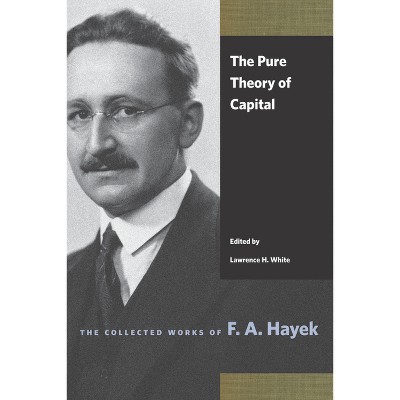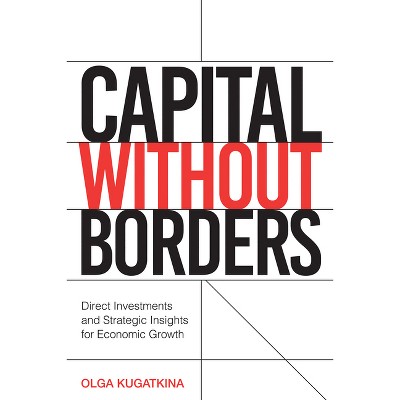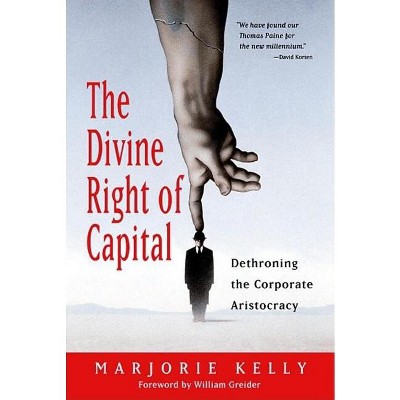Sponsored

Organizational Capital - by John Tomer (Hardcover)
In Stock
Sponsored
About this item
Highlights
- Tomer integrates economic analysis with behavioral and humanistic perspectives into a discussion of a new economic concept: organizational capital.
- About the Author: JOHN F. TOMER is Associate Professor of Economics, Manhattan College.
- 208 Pages
- Business + Money Management, Economics
Description
About the Book
Tomer integrates economic analysis with behavioral and humanistic perspectives into a discussion of a new economic concept: organizational capital. The volume fills an important void in the economic literature and provides additional insights into how internal organizational structures and relationships affect economic as well as social outcomes. . . . All in all, must reading for both economic scholars and behaviorists. Choice
Traditionally, internal organizational relationships have not been linked with the orthodox theory of the firm or with explanations for economic growth. Organizational Capital integrates organizational behavior with economic theory and offers a new unifying economic concept: organizational capital. Tomer shows how organizational capital contributes to economic growth, behavior, and the productivity of the firm. Companies investing in organizational capital are creating better functioning organizations, ones with improved structures and cultures. These improvements are embodied in the organization's relationships, its members, and its repositories of information. The author also explains how the organization can function as a guide for formulating better governmental policies with respect to economic growth. Moreover, he believes the concept of organizational capital can help us understand how institutional arrangements contribute to economic as well as social outcomes. This book will help business professionals understand how the features of organizations relate to organizational performance and productivity. It facilitates understanding of the organizational reasons for the successes of leading Japanese companies, Mondragon cooperatives, and excellent U.S. companies.
Book Synopsis
Tomer integrates economic analysis with behavioral and humanistic perspectives into a discussion of a new economic concept: organizational capital. The volume fills an important void in the economic literature and provides additional insights into how internal organizational structures and relationships affect economic as well as social outcomes. . . . All in all, must reading for both economic scholars and behaviorists. Choice
Traditionally, internal organizational relationships have not been linked with the orthodox theory of the firm or with explanations for economic growth. Organizational Capital integrates organizational behavior with economic theory and offers a new unifying economic concept: organizational capital. Tomer shows how organizational capital contributes to economic growth, behavior, and the productivity of the firm. Companies investing in organizational capital are creating better functioning organizations, ones with improved structures and cultures. These improvements are embodied in the organization's relationships, its members, and its repositories of information. The author also explains how the organization can function as a guide for formulating better governmental policies with respect to economic growth. Moreover, he believes the concept of organizational capital can help us understand how institutional arrangements contribute to economic as well as social outcomes. This book will help business professionals understand how the features of organizations relate to organizational performance and productivity. It facilitates understanding of the organizational reasons for the successes of leading Japanese companies, Mondragon cooperatives, and excellent U.S. companies.Review Quotes
?Tomer integrates economic analysis with behavioral and humanistic perspectives into a discussion of a new economic concept: organizational capital. The volume fills an important void in the economic literature and provides additional insights into how internal organizational structures and relationships affect economic as well as social outcomes. After introducing readers to the concept of organizational capital in Chapter 1, the author explains in Chapter 2 how productivity is related to organizational attitudes. In subsequent chapters Tomer integrates these organizational behavior insights with economic theory, uses the organizational capital concept to explain economic growth, discusses the concept of X-efficiency theory, and introduces the prisoner's dilemma' to explain the benefits of interfirm cooperative behavior and why this cooperation tends to break down. The X-efficiency theory is used to explain why Japanese firms are managed more efficiently than their American counterparts. Tomer argues that increased worker participation is the key to both productivity growth and employee well-being. The volume concludes with a discussion of anticipated key economic and behavioral changes and their likely impact on business firms, and a succinct summary of the implications of the organizational capital concept for US productivity. All in all, must reading for both economic scholars and behaviorists.?-Choice
"Tomer integrates economic analysis with behavioral and humanistic perspectives into a discussion of a new economic concept: organizational capital. The volume fills an important void in the economic literature and provides additional insights into how internal organizational structures and relationships affect economic as well as social outcomes. After introducing readers to the concept of organizational capital in Chapter 1, the author explains in Chapter 2 how productivity is related to organizational attitudes. In subsequent chapters Tomer integrates these organizational behavior insights with economic theory, uses the organizational capital concept to explain economic growth, discusses the concept of X-efficiency theory, and introduces the prisoner's dilemma' to explain the benefits of interfirm cooperative behavior and why this cooperation tends to break down. The X-efficiency theory is used to explain why Japanese firms are managed more efficiently than their American counterparts. Tomer argues that increased worker participation is the key to both productivity growth and employee well-being. The volume concludes with a discussion of anticipated key economic and behavioral changes and their likely impact on business firms, and a succinct summary of the implications of the organizational capital concept for US productivity. All in all, must reading for both economic scholars and behaviorists."-Choice
About the Author
JOHN F. TOMER is Associate Professor of Economics, Manhattan College.Shipping details
Return details
Frequently bought together
Trending Non-Fiction

















